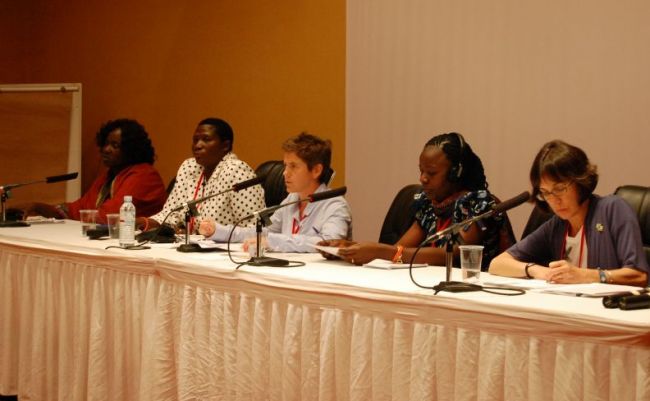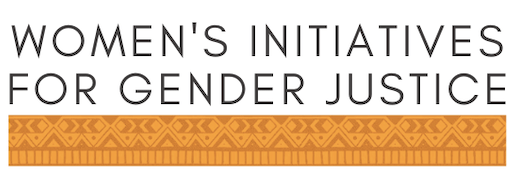
Advancing Gender Justice — A Call to Action
At a press conference held on 31 May 2010 during the Review Conference of the Rome Statute, the Women’s Initiatives for Gender Justice released an advocacy paper titled Advancing Gender Justice – A Call to Action. Joining Women’s Initiatives’ Executive Director Brigid Inder to speak at the launch of the paper were three women’s rights activists from ICC conflict situations who comprised part of the Women’s Initiatives delegation: Gladys Oyat, Greater North Women’s Voices for Peace Network, from Kitgum, Northern Uganda; Jeanine Bandu, Director of the Collective of Indigenous and Vulnerable Households, from Goma, Eastern DRC; and Albertine Tonnet, Coordinator of the Women’s Section of the United Trade Union, from Bangui, Central African Republic. Susanah Sirkin, Deputy Director of the US-based NGO Physicians for Human Rights, also offered her reflections on the Call to Action.
At the press conference, women from the conflict situations spoke of the urgent need for justice through both international and national accountability mechanisms. Gladys Oyat from Northern Uganda asked, ‘Shall the (Ugandan) victims get justice within the given time frame? We have evidence in Uganda that sometimes issues of importance may not be taken with the seriousness they deserve. They start with high flames but soon die out like a candle in the wind. Who can give assurance to the hurting people that justice will be done as fast as possible? Remember, Justice Delayed is Justice Denied.’ Read Gladys’ full press statement.
In the Call to Action, the Women’s Initiatives outlines priorities for advancing gender justice through the ICC, as well as regional and national judicial systems, over the next three years. These priorities emerged from our country-based programmes and partnerships, advocacy initiatives with the ICC and consultative events in the lead up to the Review Conference.
The priorities identified in Advancing Gender Justice — A Call to Action include:
- Institutional strengthening, such as enhancing the gender capacity at the ICC and regional human rights bodies;
- Implementation of the Rome Statute and complementarity strategies that include, for example, full domestication by states of the gender provisions of the Rome Statute, the Elements of Crimes and the Rules of Procedure and Evidence;
- Making victims’ participation genuine and meaningful at the ICC and in other justice processes through mechanisms such as an accessible legal aid framework, policies that address the participation of vulnerable victims, and a comprehensive security framework;
- Increasing resources for the ICC Trust Fund for Victims and developing a set of gender-inclusive, victim-centered guidelines for case-based reparations;
- Stronger and more consistent jurisprudence on gender-based crimes from international and hybrid criminal tribunals; and
- Enhanced state cooperation in their responsibilities as to assist the ICC with arrests of suspects, freezing and seizing of assets, and promotion of universal ratification of the Rome Statute.
The paper also addresses priorities for advancing gender justice through peace processes, including that the process and outcomes of peace talks comply with UN Security Council Resolutions that mandate women’s participation in peace processes, that women be appointed as chief mediators of peace talks, and that women are recognised as key stakeholders and equal partners in the implementation of peace agreements.
Download a copy of Advancing Gender Justice — A Call to Action.
Read the press statement by Brigid Inder, Executive Director of Women’s Initiatives for Gender Justice.
